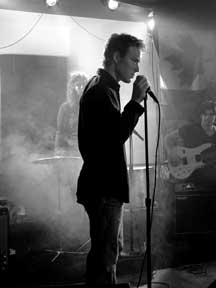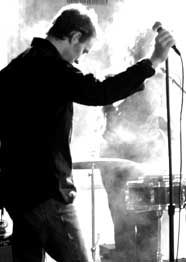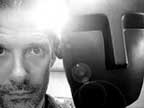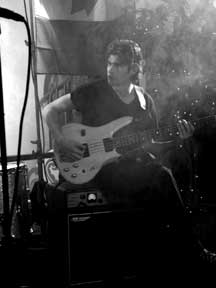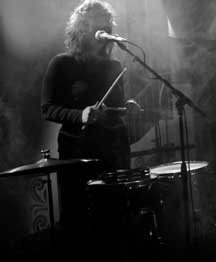 |
|
| home | |
| the songs | |
| discography | |
| tour archive | |
| reading | |
| CKM label | |
 |
 |
|
From Ripsaw News, 18 September 2002
By Chris Godsey
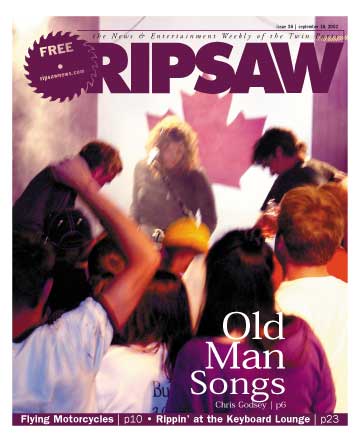 photograph by Chuck Watson
Hold a Low CD flat in your palm. Does it seem heavier than other discs? Do its sparse sounds, even silent, press upon your life line with disproportionate weight? Maybe it takes listening experience—eyes closed as “Laser Beam” courses like liquid heartbreak between headphones; mindstate ecstatic, tossed ever upward in a transcendental “Starfire” frenzy—to truly grasp such latent sonic gravity. But even Low virgins, exposed only to cryptic cover art, tantalizing song titles and that mysterious, adjectival name (Is it really as simple as it seems? Why only one word? What does it mean?) must understand they’re holding something unusually substantial.
Dark Confessions Trust, Low’s latest full-length CD, set for release Sept. 23 on Kranky Records, maintains that enigmatic density. While it offers many moments that are, in relative terms, faster, louder and catchier than Low discs past, it’s still thick with powerful melancholy. Upbeat mantras of regret mingle with gorgeous dirges about lives corroded, maybe crushed, by time. Nearly every track contains some sort of tortured backward gaze. Hope among the songs’ speakers is seldom apparent. “This one’s a little darker than the last one,” Low singer and guitarist Alan Sparhawk said in early August. “We’ve always been pretty dark, especially on stuff like Long Division and Songs for a Dead Pilot. This record is more confessional. It’s about being an old man. “There are a lot of songs on this record that kind of feel like someone is on their death bed, basically trying to leave the world with some last words. I guess my completely uninfluenced reaction to this record was that it was really difficult … and a little more serious and a little heavier.” That heaviness—and there’s a lot of stuff, aurally and emotionally, that’s very heavy—is sometimes obscured by a strummy, almost sing-songy vibe that belies what the words are actually addressing. Sparhawk said he’s “kind of surprised” by reactions from people who say things like, “Wow, it sounds great! I just want to listen to it over and over again. We were driving up the shore, watching the trees go by and listening to your record and it was just so nice. The sun was out and … ” And here Sparhawk’s face scrunches with consternation and he rhetorically implores, “What are you talking about?” Bassist Zak Sally concurs: “I thought this record was way more dark and difficult than the previous ones. … There was actually a long time where we were pretty set on making a record that was difficult and unlistenable. We failed.” “Yeah, we failed,” Sparhawk said. “It’s not so much that we wanted to be badasses and repulse people as much as it was kind of like … ” “A lot of records that we hear from other people … sometimes the hardest things to listen to are some of the most rewarding,” Sally said. “Endearing, yeah,” said Sparhawk. “I don’t think there’s any song [on Trust] where we were like, ‘Ha ha ha. Everyone’s gonna really hate this, and it’s gonna be great because it’s gonna make people want to turn off their radios,’ even though we kind of fantasize about that. We know what that’s like. We’ve done that. There’s a certain satisfaction in that, and a certain rise you get by doing that, but … ” “In a way it’s the same as the last one [2001’s Things We Lost in the Fire],” Sally said. There are some songs on this record where—this is going to sound cheesey—we were like, ‘This is a serious song that requires a certain thing to it, so let’s make sure that we don’t neglect that and that we do our best.’ It’s the same as saying, ‘We have a pop song here, let’s not back away from that.’ If it’s brutal, let’s make sure it’s brutal.” Which songs does Sally think are serious? “Songs like ‘John Prine.’” So what’s so brutal about “John Prine”? “It just is.” “There are a couple little contradictions” on Trust, Sparhawk said. “A couple kind of pop songs. That’s something that’s been creeping up in the last couple records. On the last record we were really excited about making a pop record. We kind of got through that. This time we wanted to just be brutal—a little more raw. No strings, no fancy prettiness.” “There’s some prettiness on this one,” said Mimi Parker, who sings and plays percussion in Low, and who’s married to Sparhawk. “But in a bleak sense,” he said. “Just the vocals themselves pretty it up a bit,” continued Parker. “There are some vocal harmonies that are very elaborate, but I’m still not sure what this one’s doing. I think it’s gritty, grave-digging music,” Sparhawk said. “I like the record,” Scott “Starfire” Lunt, namesake of the Low classic on Secret Name and a longtime Low fan, observer and confidant, said about Trust. “It’s super listenable as a whole. The sequencing is great. It seems like all the songs come around at just the right time. “’Diamond’ is one of the most soulful Low songs I’ve heard. ‘Shots and Ladders’ is just pure psychedelia. ‘John Prine’ is great. That piano song Mim sings [‘Point of Disgust’] … if anything, I wish there was more Mim. Her voice has three or four distinct qualities—super sultry, sexy, high. Everything on this new record seems logical to me. I love the feel. All the stuff done in the church is just so wet. It feels like you can swim through the record.” Sacred Ground The “church” of which Lunt speaks is Sacred Heart Music Center, a former place of religious worship that now houses a recording studio run largely by Sparhawk, Tim Nelson, Tom Fabjance and Eric Swanson. Low worked on most of Trust at the church and will play a concert/CD release party there on Sept. 28. According to Sparhawk and Sally, recording at Sacred Heart provided unique opportunities and challenges. “It was kind of weird,” Sparhawk said. “It was the first time we’ve done a full length project in Duluth. Christmas was done at home [in a basement studio], in bits and pieces, but our attitude was that it was just a fun thing for our fans.” “I don’t think there was a moment we were comfortable at Sacred Heart,” Sally said. But he and Sparhawk were quick to qualify that discomfort is a hallmark of their process. “I think if we at some point ended up making a record and feeling really comfortable with it we’d all look at each other and say, ‘what’s wrong?’” Sally said. “Or it would be obvious a month later that it was horrible,” Sparhawk said. “I think that’s what happens when Bruce Springsteen and Robert Plant and these guys who have the money and the time to make everything comfortable. They make records that are not as interesting as when they were sleep-deprived and had only three days to make an album.” “I agree,” said Sally. “Although I think the new Bruce Springsteen single is great. I love it.” “Is it?” replied Sparhawk. “I haven’t heard it.” Back on the subject of Sacred Heart, Sparhawk said, “There were a lot of quirks to work out. I don’t think we’ve ever been comfortable anywhere, even at home. I think there’s always kind of a ‘Geez, what are we doing?’ I’m constantly amazed at how … I remember moments of doing some part and thinking, ‘That was so uncomfortable.’ I can sit at home and play guitar in a room, and every once in a while there will be these moments that are kind of like, ‘Wow. This sounds right. This is the way something’s supposed to sound. How come this never happens in the studio?’ “Some of the vocal times [at Sacred Heart], I’d say there were some times when it got comfortable, and I felt like, ‘This is a cool little space, and I’m comfortable here and I feel happy. Despite the fact that the studio was new and there were some things we were having to work out. I think that just happens. You’re always going to be uncomfortable. The space was fine. In fact, in the end, the only way to remedy the discomfort is to tell yourself that at least what you’re trying to do is different and interesting. That’s how you can kind of convince yourself to say, ‘Look, relax. It’s going to be fine.’ Whereas at home, if you’re uncomfortable in your home surroundings, there’s no way you can convince yourself that everything’s OK, because you think, ‘No. I know this space, and I know what can be done here, and this is not any of the good things that can be done here.’ Whereas at Sacred Heart it was like, ‘Well, this is a great space. Let’s just trust that this is going to work, because it sounds cool.’” The Crying Room While some of the recording for Trust was done in Minneapolis at Tom Herbers’ Third Ear studio, most of it was done at Sacred Heart, with a lot of help from Swanson. “We were in the main chapel or sanctuary,” Sparhawk said. “That’s where you track things. The control room is in the crying room. We’re actually thinking of changing the name of the studio to The Crying Room—all the equipment and the mixing board is in there. It’s perfect for a control room, because it’s sort of soundproof and there’s a window so you can see what’s going on out in the main room. “We did some of the vocals in the bathroom. We played with different sounds in different spaces. The main room is very reverberant. It sounds like an old cathedral. It’s nice, but you don’t want it all the time. Some stuff it’s good for, and sometimes it’s not.” “I’m pretty happy with how we explored the possibilities of micing that place,” Sally said. “We tried to record sound in a lot of different parts of the space. Some of it I’m really happy with, and at the same time we realize we’re only scratching the surface.” Sparhawk said that while recording “La La La Song,” he “did the vocal in the big room, and when it came time to ‘la la la,’ I just turned around and faced the wall, and what happened was that by the time the sound got to the microphone it had bounced around the room. When it gets to the last chorus, there’s kind of a drum hit that you hear, and that’s hitting the drum and micing it way on the other end of the room. A Simon & Garfunkel thing.” Over the Ocean After everything was recorded, Low packed up for the U.K., where Tchad Blake, who’s worked with Sheryl Crow, Elvis Costello, Peter Gabriel, Soul Coughing, Fishbone, Tom Waits and many others, did the final mixing. They were with Blake for a week, and although he’d not heard the raw tapes before then, Sally and Sparhawk said the process was fruitful. “I think he enjoyed it because it was spontaneous, as opposed to months and months of mixing one song,” Sparhawk said. “Tchad is very, very good at what he does,” Sally said. “All of us were just sitting there for the first day sort of looking at each other and saying, ‘Well, this is better than we thought it would be.’ Then we had to get ourselves back in the mode of being able to say, ‘Hey, Tchad, uh … ’ If we had just a little bit of an idea he’d be totally open to it.” “We were there the whole time, and if there was something we were really determined to have prominent, or if we weren’t sure we wanted something so up front, he’d listen,” Sparhawk said. “There were maybe half a dozen instances where we were kind of steering him, as far as stuff like, ‘Well, that’s maybe a cool idea, but we were thinking … ’” Sally said, “There were lots of situations where he’d find the weirdest, most buried sound on the track and just turn back to us and we’d be like, ‘Oh. We can mute that,’ and he’d say, ‘Oh, I thought we should solo it. It should be really loud.’ It was really nice to have someone who is on the same page as you in terms of what things you like about sound and randomness.” By early August, months after they’d finished recording and a day before they left Duluth for the Benicassim festival in Valencia, Spain, Parker, Sparhawk and Sally hadn’t formed a definitive opinion of Trust. “I’m pretty happy with it,” Sparhawk said. “In the process of making it I think we spent a lot of time kind of not sure what we were trying to do, not sure if we were getting it to work. I think towards the end, and especially during the mixing, it kind of became a lot more reassuring, confident we had the right sound.” “I think mixing is where it fell apart for me,” said Sally. “Really?” asked Sparhawk. “Mixing is where it always falls apart for me.” “Yeah.” Sally continued: “I think it always falls apart during mixing for me, but I think we took a lot more time making the record and mixing it, and I think the more time you have to spend thinking about those things the harder it might be to keep perspective or gain perspective on what you end up with, because you’ve gone through all these processes to try and figure it out, and you have to come up with one, one … what’s the word I’m looking for … with one cake that comes out of the oven.” “Yeah,” said Sparhawk. “I think the more time you spend with something, the more options you allow yourself to play with, and the harder that question becomes of whether you’re happy with what you’ve done. It’s just so much harder to take into account that it can sort of drown your ability to see what’s going on. We’ve probably felt that way with every record. There’s these kind of wild variations between really being happy with it and thinking we needed to redo it or thinking it was a complete waste of time or something. I think it’s something most people go through—it’s just not very fun at the time. “I mean, we’re happy with it now. I’m happy with it. The people that we deal with seem to be pretty happy with it, so it’s kind of exciting to be having it come out pretty soon. I don’t know … I actually haven’t listened to it much lately. There was the process of making it, and then, the process of listening to it afterwards, and most records become a diminishing return for me the more I listen to them until maybe four or five years later, then I can listen back and say, ‘Oh, wow. That was all right.’” Great Expectations? “I know we had some pretty serious ideas going into [Trust] which I wouldn’t really be able to explain out loud,” said Sally. “Maybe some things that we wanted to try to do, and those things were sort of varied. I think the end product is that we hit some of them. I think the hope with any record is that you hit some of them, and there’s enough surprises in there for you that maybe you weren’t hitting exactly what you were trying to hit but you might have found something else entirely. I think you can find pieces from this record in most of the other records we’ve done, but hopefully in a way that’s not repetitive. I would just hope it’s more … focused? Maybe?” “Yeah. I think it’s the most pointed record,” Sparhawk said. “I don’t know if it’s songwriting or confidence or experience or what. I think the last couple records I was a little bit more obsessed with the sounds of things. Arrangement and styles and things like that, and on this record, after we had the songs written, I felt like, ‘Well, these are good songs. Let’s just play them. Let’s not get too hung up on certain things.’ I knew that if we could nail the songs somewhat accurately it was going to be as good as it was going to be.” Nailing new studio songs live is a challenge Parker said she’s looking forward to. “The new songs always add a little bit of tension because, for one thing, we’re not very familiar with playing them,” she said. “Even though it is a little more tense, I tend to enjoy those moments when they go well, more than, say, playing a song we’ve played 150 times already.” “There’s a kind of moment that happens after you’ve played a new song three or four times live when it finally comes together,” Sparhawk said. “And that’s about as good as it gets.” “And then it goes downhill,” Parker laughed. “A couple of the songs are really new,” Sparhawk continued. “We haven’t really played them live. ‘Shots and Ladders’ I’m kind of excited to figure out, because we kind of just went nuts with it in the studio and it’s not practical to try to duplicate live, so we’re going to have to find some different way of playing it, and hopefully with similar effect.” Gravitating Toward Frugal They’ll get a chance to test the new stuff soon, on a U.S. tour that begins Oct. 2 in Chicago and ends Nov. 23 in Minneapolis. More dates in the U.S. and Europe are planned for late 2002 and early 2003. These tours, and this time in their lives, are finding Low at a significant juncture. They’ve been on the road for the better part of ten years; Parker and Sparhawk’s daughter, Hollis, is almost three years old, and those concepts are changing some of their perspectives. “It is a little harder with Hollis,” Sparhawk said, “and there’s a little bit of, ‘Gee, we’ve been doing this a long time, and sometimes it’s not very fun. After you’ve done it a lot of times the things that were fun about traveling the first few years are not fun anymore. ‘Ha ha. It’s three in the morning and we can’t find a hotel, isn’t this fun? This is crazy. Wow, this is so punk. We’re gonna have to sleep in the van.’ It’s not as fun anymore with those kinds of things. “Playing has never been better. We enjoy playing, and the last few years we’ve been able to play some really nice places that are a pleasure, and obviously more and more people are coming and that’s a good feeling. It’s nice filling up a nice place and playing a show you’re confident in.” Sparhawk said the band has been “gravitating toward something a little more frugal” in terms of the frequency and duration of its tours. “It’s taking a long time to get there, but I can see it on the horizon. I have a feeling we probably will not be touring the same way that we have been once we’re done with this record. Sometime early next year, once we get done everything we need to do. I think it’s going to really quiet down. I guess it would be nice to arrive at a point where we don’t feel torn between going out and playing every major city every year and doing all the stuff we’ve done a lot. “But then, who knows? There was a time when we were like, ‘Wow. We love touring and we would tour as much as we could possibly go and man, I wish we could get even more shows because that’s what we do and this is what’s gonna help things go well. Now we’re like, ‘Well, uh, playing and stuff is fun, but let’s see if we can figure out an equilibrium where we’re not going completely insane but we’re still playing what we want to play.” While Sally doesn’t have children, he said he shares his bandmates’ perspective on touring. “I think you’d be hard pressed to find a band that has been around for as long as we have and worked, between recording and touring, as hard as we have. You’d be hard pressed to find a band that hasn’t stopped or who has done things as consistently, for the amount of time, that we have. … I’m pretty proud of the way we’ve done things and the way we’ve conducted ourselves, and I’m glad that we’re going out and playing behind this record and playing these songs for people. “I guess we should go practice.” Chris Godsey is a regular contributor to the Ripsaw.
« Back to other articles from 2002
|
